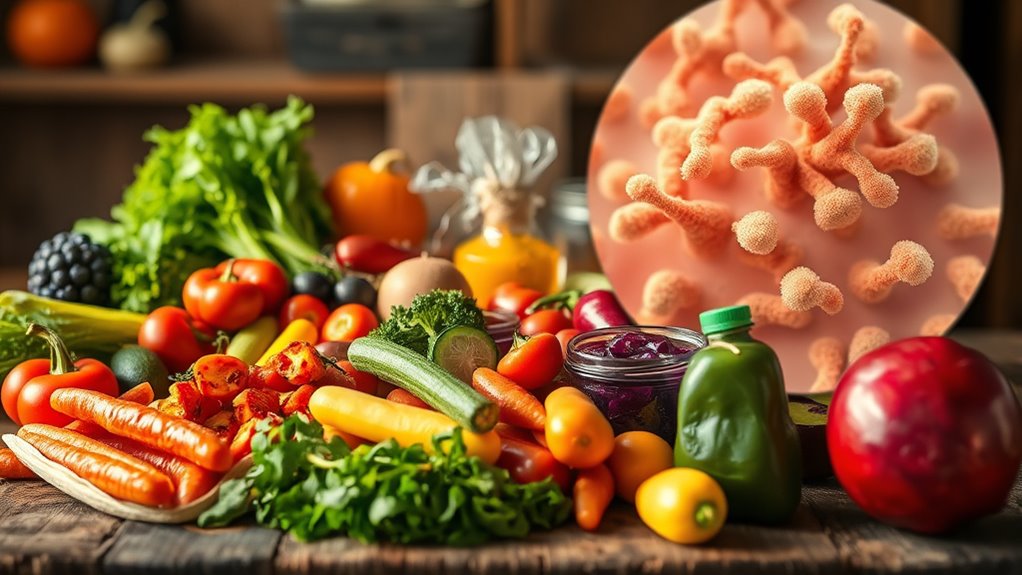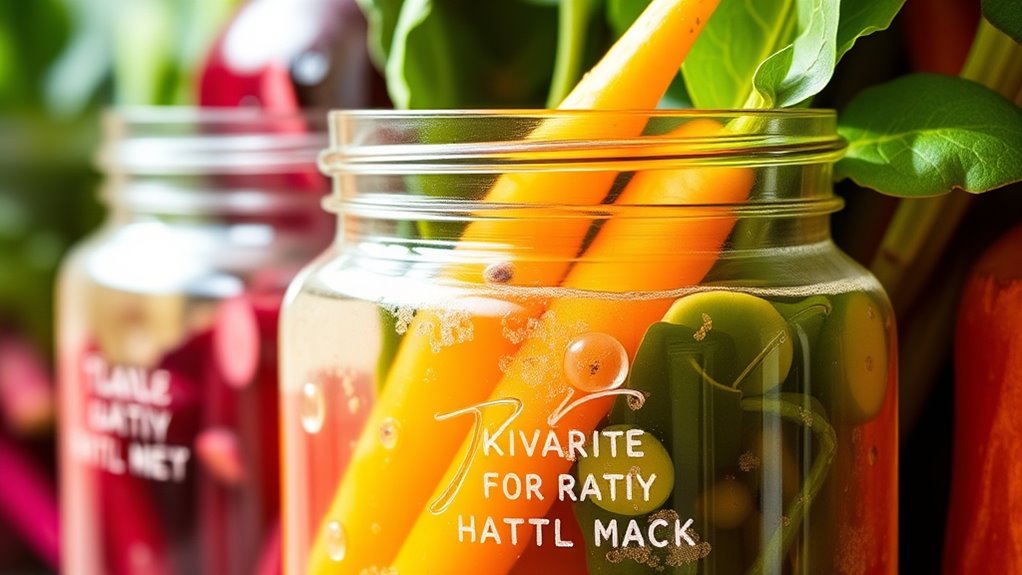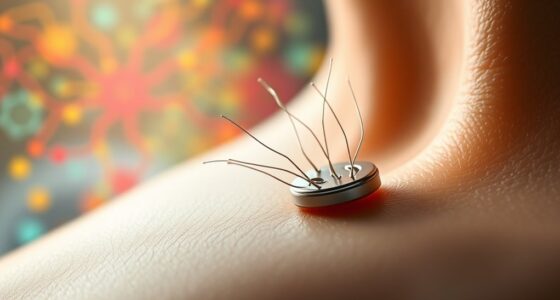Your gut microbiome greatly influences how your body processes food, controls appetite, and manages weight. If your microbiome lacks diversity or has an imbalance, it can sabotage your diet by making you crave unhealthy foods and hindering nutrient absorption. A low-fiber diet or only taking probiotics without supporting your gut with the right foods can make things worse. Understanding how to nurture your microbiome might be the key to your diet success—keep exploring to learn more.
Key Takeaways
- An imbalanced microbiome can impair digestion and nutrient absorption, hindering weight loss efforts.
- Low fiber intake reduces beneficial bacteria, weakening microbiome resilience and increasing cravings.
- Unhealthy gut bacteria may promote inflammation, disrupting metabolism and making dieting more difficult.
- Antibiotic use can diminish healthy bacteria, leading to a less diverse microbiome that sabotages health goals.
- Poor diet choices can lead to microbiome imbalance, negatively affecting satiety and increasing overeating tendencies.

Your gut microbiome—the trillions of bacteria living in your digestive system—plays a essential role in your overall health, and what you eat directly influences its composition. If you’re not paying attention to your diet, these microorganisms might be working against your goals, sabotaging your efforts to stay healthy or lose weight. One of the most effective ways to support a balanced microbiome is by incorporating probiotic supplements and increasing your fiber intake.
Probiotic supplements contain beneficial bacteria that can help restore or maintain a healthy gut environment. They are especially useful if you’ve recently taken antibiotics, experienced gastrointestinal issues, or suspect your microbiome is out of balance. When you take probiotics, you’re introducing live strains of bacteria directly into your digestive system, which can improve digestion, reduce inflammation, and even enhance your immune response. However, probiotics are most effective when paired with a diet that nurtures these good bacteria, and that’s where fiber comes into play.
Probiotics support gut health, especially after antibiotics, when paired with a fiber-rich diet for best results.
Fiber is the primary fuel source for many beneficial gut bacteria. When you consume enough fiber-rich foods—such as fruits, vegetables, whole grains, and legumes—you provide these bacteria with the nourishment they need to thrive. As they ferment fiber, they produce short-chain fatty acids, which are essential for gut health, reducing inflammation, and supporting your immune system. If your diet lacks sufficient fiber, your microbiome may become less diverse and less resilient, making it harder to process foods efficiently, absorb nutrients, and even regulate your weight.
Research also shows that a diverse microbiome is linked to better overall health and disease prevention diverse microbiome. Many people underestimate how much fiber they need daily. The general recommendation is around 25 grams for women and 38 grams for men, but most people fall short. Incorporating more fiber-rich foods into your meals not only benefits your gut bacteria but also promotes satiety, helping you control cravings and avoid overeating. Combining a high-fiber diet with probiotic supplements can amplify the positive effects, fostering a microbiome that supports your health rather than undermines it.
Frequently Asked Questions
Can Probiotics Permanently Alter My Gut Microbiome?
Probiotic permanence varies; typically, probiotics offer temporary changes to your microbiome. Your gut microbiome’s stability depends on your diet, lifestyle, and environment. When you take probiotics, they may help introduce beneficial bacteria, but these are often replaced over time without ongoing intake. To maintain microbiome stability, consistent healthy habits matter more than the permanence of specific probiotic strains. So, probiotics alone usually don’t create lasting changes without ongoing support.
How Quickly Does the Microbiome Change After Diet Modifications?
When you change your diet, your microbiome starts to adapt faster than you might think, but don’t expect miracles overnight. It’s a slow dance that tests your resilience, with some shifts happening within days and others taking weeks. Your microbiome resilience varies, so consistent diet adaptation is key. Think of it as turning the tide gradually; patience helps your gut bacteria align with your new eating habits.
Are There Specific Foods That Improve Gut Diversity?
You can boost your gut diversity by eating specific foods like fermented foods and dietary fibers. Fermented foods, such as yogurt, kimchi, and sauerkraut, introduce beneficial probiotics that enhance your microbiome. Meanwhile, dietary fibers from fruits, vegetables, and whole grains serve as prebiotics, nourishing good bacteria. Incorporating these foods regularly helps increase microbial diversity, supporting better digestion, immunity, and overall health.
Can Gut Bacteria Influence Mental Health Alongside Dieting?
Yes, gut bacteria can influence your mental health through the gut-brain connection. When your microbiome stability is disrupted, it can affect mood, stress levels, and cognitive function. The microbiome communicates with your brain via chemicals and neural pathways, impacting mental well-being. Maintaining a balanced gut microbiome supports both your overall health and mental clarity, highlighting how essential microbiome stability is for emotional resilience and mood regulation.
Do Antibiotics Have Long-Term Effects on Gut Microbiome Health?
Imagine your gut as a medieval fortress under siege—antibiotics can be the battering ram. They often cause long-term effects on your microbiome health, disrupting balance and leading to antibiotic resistance. Recovery varies; some bacteria bounce back quickly, while others take months or years. Long-term microbiome recovery is essential to restore healthy gut function, highlighting the importance of judicious antibiotic use to prevent lasting damage and resistance.
Conclusion
Think of your gut microbiome as a tiny team of chefs in your stomach, each with their own recipe. When they work together, they help you stay healthy; but if one starts sneaking in junk ingredients, your diet can backfire. I once knew someone whose gut microbes favored sugary snacks, making it nearly impossible for her to resist desserts. Keep your microbiome balanced, and it’ll be your ally, not your obstacle, on your diet journey.










